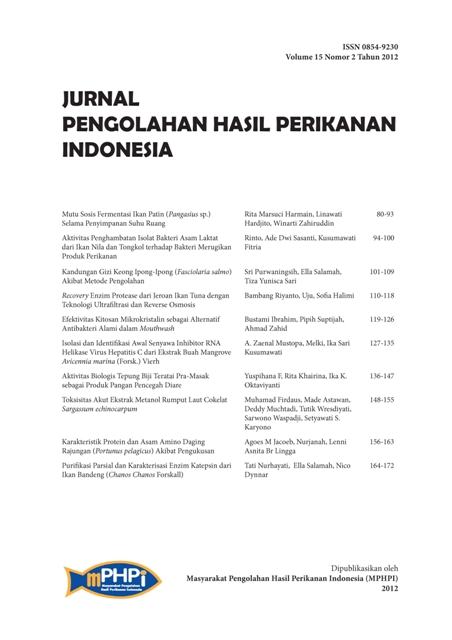KANDUNGAN GIZI KEONG IPONG-IPONG (Fasciolaria salmo) AKIBAT METODE PENGOLAHAN
Abstract
Ipong-Ipong (Fasciolaria salmo) snail is a local name of marine mollusc from gastropod class in Cirebon, West Java, which is consumed by public and believed to improve health. The purpose of this research was to find out effect of processing (boiling, steaming, and boiling with 3% salt water) methods on the nutrition content, such as proximate, fatty acids, and cholesterol in F. salmo. The data were analysed using the analysis of variance test (ANOVA). The Duncan test was used to compare means when a significant variation was highlighted by the ANOVA. The results showed nutrition content of fresh F. salmo was: 72.10% water (wet matter basis); protein 62.72% (dry matter basis), ash 7.80% (dry matter basis), cholesterol (0.045%) and 1.71% fat (dry matter basis), monounsaturated fatty acid (11.75%), polyunsaturated fatty acids (7.31%), polyunsaturated fatty acid long chain (5.34%), and saturated fatty acids (long-chain) (4.03%). Acid insoluble ash content was 0.72%. The results of statistical analysis showed that processing method impact the nutritional value of F. salmo. The results of duncan test showed that decreassing content of proximate dan fatty acids caused by steaming method was lower than the boiling and boiling with 3% salt water method. From the research results recommended that the best treatment method is steaming.
Keywords: cholesterol, Fasciolaria salmo, fatty acid, processing methods
Authors
Authors who publish with this journal agree to the following terms:
- Authors retain copyright and grant the journal right of first publication with the work simultaneously licensed under a Creative Commons Attribution License that allows others to share the work with an acknowledgement of the work's authorship and initial publication in this journal.
- Authors are able to enter into separate, additional contractual arrangements for the non-exclusive distribution of the journal's published version of the work (e.g., post it to an institutional repository or publish it in a book), with an acknowledgement of its initial publication in this journal.





